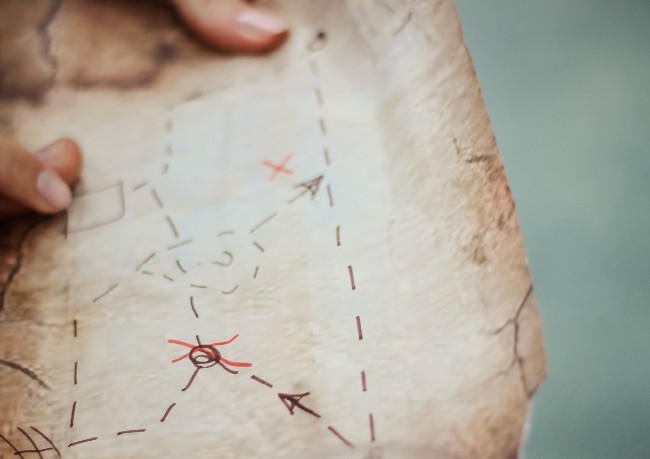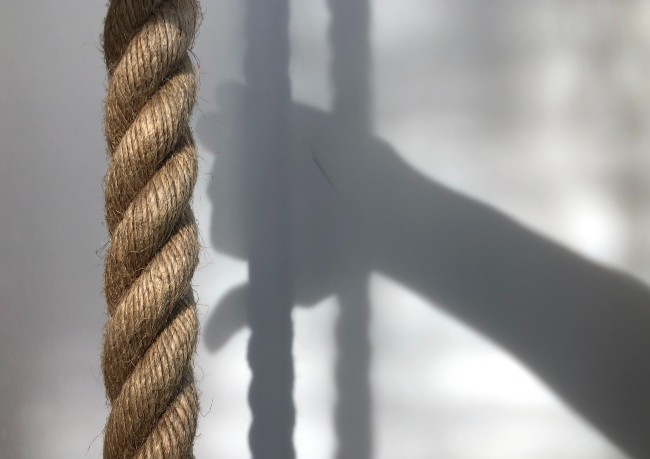
Image by Daniel Lerman
When you have no idea what else you'd like to do, where does inspiration come from? Our Career Change Launch Pad participants have grappled with exactly this question – and discovered some unexpected answers. Natasha shares what she's learned.
Drawing a blank on your dream career?
It’s fairly reasonable to come to the conclusion that the answer is going to have to come flying out of left field. If it wasn’t going to be something totally unexpected, you’d know what it was by now, right? Or at the very least you’d have an inkling of a direction to head in.
Not necessarily.
The answer to your perfect career is unlikely to be a big-bang surprise.

Chances are, it’s far more likely to be a series of clues, treasure-hunt-style, that require you to: a) look closer to home than you might originally think, and b) take some action.
In fact, chances are, you already have a pretty good idea of what you’d like to do (even if you think you don’t).
And chances are life’s giving you clues as to what your ideal career might be every day.
It’s incredible – when I talk to people who have found their ‘purpose’: a career they love, a cause they’re passionate about, a lifestyle they’ve designed themselves – they’re so often amazed by the way that their journeys unfolded along pre-existing lines.
"I always loved writing, but I never thought of it as a career. It was just that thing I did in the evenings – it was more of a muscular tic than a career possibility! Or so I thought, until my boyfriend sent a sample of my work to a publisher behind my back." – Sam
The pressure of looking for the big picture is blinding

When you’re in a job you don’t enjoy and you’re looking for a way out, the urge to find an answer and feel happy again can be utterly overwhelming. It saps your energy and makes you feel hopeless. And what’s worse, it narrows your field of vision entirely.
‘I had three boxes of dog training magazines in my living room. I walked past them every day. I probably sat next to them while I tore my hair out trying to figure out what I wanted to do with my life. How could I have missed the signals for so long?’ – Kelly, Career Change Launch Pad participant
We miss the signals because we’re looking for something else. We’re looking for the Big Answer exploding from the horizon, when actually what we need to be looking for is much closer to the ends of our toes.
Stepping-stone style, we make our way to work we love by following a trail of signals, or clues. This signal shows us where to look next, and there we find another clue, and another… and before long we find ourselves firmly on the right path.
But even when we start looking closer to home, the clues are not always easy to get a grip on.

If they’re too obvious, we disregard them as ‘just hobbies’ like Sam, or, like Kelly, don’t even think about them long enough to disregard them.
Hints and ideas about where you should be headed can seem like red herrings:
“Is this really what I want to do with my life, or am I just grasping at air because I want something solid to hold on to? Am I fooling myself?”
Even if we do spot them, we allow our limiting beliefs to shut down the possibility in seconds:
‘I’m too young/too old. I have kids. I couldn’t retrain. It’ll cost too much money. I’m not good enough at X. My CV is full of Y.’
So how do you spot the clues? And once you’ve spotted them, what do you do with them?
If the big picture isn’t clear, leave it out of focus

A rare few people are lucky enough to have a strong sense of where they want to be and what they want to be doing. But for most career changers, our time is better spent focusing on what’s right in front of us.
Don’t worry about reaching the final destination right now, just look for the first clue to the journey. So you can’t pin down your dream career right now. What can you do right now to get you a little bit closer?
You don’t know what you’d love to do for work. But what do you know about yourself?
Start from where you are. Do what you can. Focus on what’s available to you right now, and trust that if you honour each clue that shows up in your path with curiosity and respect, they will carry you to where you want to be.
One of the Career Change Launch Pad participants, Simon, told us when he started the course he had no idea what a career he loved might look like. However, he had always been interested in mindfulness and meditation, so he tried designing and running a short workshop in mindfulness with his colleagues at work. The experience confirmed for him how much he enjoyed sharing his passion with others, and that it could be a viable business idea, and he’s now setting up a business with two of his colleagues. By taking the pressure off and allowing himself to simply explore the things he loved, he realised that the answer was right in front of him all along.
Pay attention to everything

Try this idea on for a moment: what if you already know what you’d love to do as a career? Perhaps not the job title or the exact manifestation, but the general idea. What if you just don’t see it as a possibility yet?
Our greatest strengths are the things we do so naturally, we don’t even see them as skills. And the things we love to spend time doing are the things we automatically gravitate towards – the things we already spend our time doing whenever we can get the chance. So when we look for a career change, we often overlook these clues; it’s almost as though they’re too obvious to seriously consider.
Try actively seeking them out. Pay close attention to the things you do well, the things you automatically gravitate towards, and the things that inspire and excite you. Ask the people around you what they think you’re naturally all about. Look for patterns.
If you’ve always been into sports, get curious about what aspect of sport you’re most fascinated by. Do you have a superhuman recall of how every match your team ever played went down? Are you an amateur sports physiology boffin? Do you love following the buying and selling of teams? What could that natural love and skill of yours turn into, I wonder?
Are you always the one people call on when they have an event to plan? Birthday parties, a stag do, a wedding – do your friends always turn to you for advice and your military-style organisational skills? That bat mitzvah you pulled off wasn’t just a favour for a friend; it was a glorious exhibition of your skills and talents. And it’s worth following up.
Or maybe you’re a doodler. Maybe you doodle all day long. Maybe your partner is constantly griping at you for sketching patterns all over the backs of important documents – maybe the phone pad has no space left to write down that message because you’ve filled it with spirals and curlicues. Sure, they’re just doodles right now. But what could they be?
Honour each skill, interest and passion as a genuine possibility.
Test-drive as many ideas as you can

I wonder how many career options have passed through your mind since you started thinking about your career change. And of those, I wonder how many you’ve truly explored.
The only way to truly overcome limiting beliefs is to prove them wrong – and you can only do that by taking action: talking to people, and getting connected with reality, rather than the negative voices in your head.
How many entrepreneurial ideas have you tossed in the bin because you’re certain they’ll cost a bomb to launch? And how much of a basis in reality does that certainty have? Talk to start-up specialists. Read $100 Start-Up. Try launching one of your ideas on as small a scale as possible. It’s time to start pulling those clues you’ve been tossing away back out of the trash.
Career Change Launch Pad participant Michelle was thrown in at the deep end when she was forced to take over running the catering at a friend’s christening. While she’d always had an interest in cooking, she believed becoming a chef would take too much time and that the business was too competitive, especially for a woman. She passed it off as a ‘nice idea’ that would never become reality. But once she’d had a taste of what running a kitchen could be like, she was hooked – and now she’s working on starting up a catering business, safe in the knowledge that she’s going to enjoy her work once she makes the move from her current job.
And that’s another brilliant thing about the test-drive - it also means you get to start doing your new career before you've left your current job, so you can be absolutely sure that when you do make a move, you're not just leaping blindly into another field that you might not enjoy.
So every time a potential clue pops up on your radar, follow it up somehow. Make a phone call to a friend who knows more about the field you’re thinking of. Cold-call a company in the industry. Go to a class. Teach a class. Get curious. See where it leads.
Recognise that your first clue is only the start of the journey

The great thing about a treasure hunt is that one clue always leads to another. And so it is with career change. It’s very unlikely that the first clue you explore will be the career of your dreams, but it will spark a conversation, or an idea, or a realisation that will lead you to the next clue. And then to the next. And the next.
Another Career Change Launch Pad participant, Nicky, spent an afternoon helping a friend make Christmas decorations for her business. While the experience wasn’t related to her career aspirations directly, it did get her thinking about the idea of a franchise, which moved her forward one step in her journey to a career she loves (Nicky received three job offers toward the end of the Career Change Launch Pad).
Get curious about each test-drive you take. What did you like about it? What didn’t you like? What did you learn? Did you make a new contact to follow up with? What was the next clue to follow?
Start from where you are, and then keep looking for your next clue. So long as you believe wholeheartedly in the process, you can’t help but move forward. And one day, almost without realising it, you’ll arrive at the answer you were seeking all along.
What do you think the first clue on your journey might be, and how could you explore it further?




